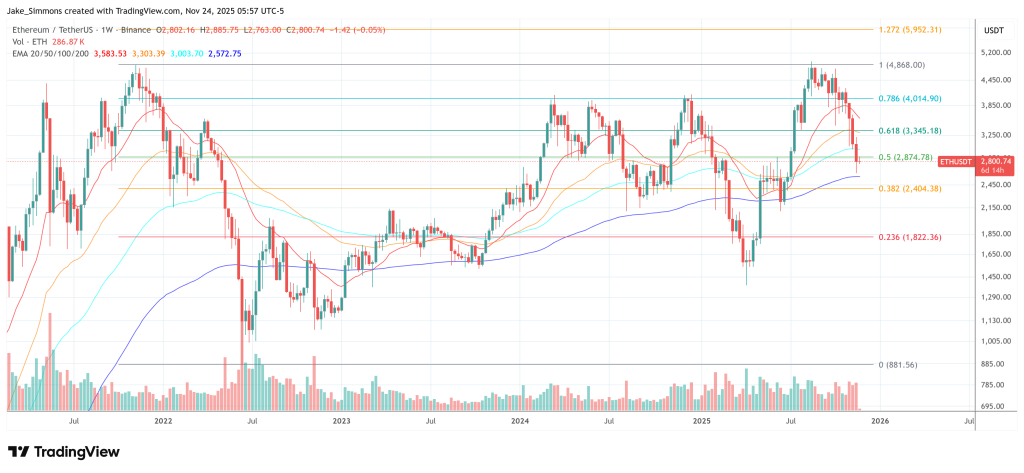Ethereum co-founder Vitalik Buterin is sounding the alarm over X’s new “show which country the account is from” transparency tag, arguing that the feature will be quickly undermined by spoofing while exposing some users to unacceptable privacy risk. X has recently expanded its “About This Account” surface, letting users see metadata such as an account’s country or region alongside creation details, a move the platform positions as a tool against manipulation and inauthentic behavior.
Ethereum Founder Sounds The Alarm
Buterin’s first post acknowledged near-term upside but framed the system as fragile under adversarial pressure. “In the short term it will have lots of positive effects,” he wrote. He then predicted that sophisticated operators will adapt faster than the platform can harden the signal: “the sophisticated actors will find ways to pretend to be from countries that they are not,” pointing to rentable passports, phone numbers, and IP infrastructure that can be used to manufacture plausible provenance.
His core asymmetry claim was blunt: “Getting a million accounts with fake location will be medium-hard, getting a single account with fake location, and then getting it to a million followers, will be easy.” In his view, the feature will drift from authenticity check to theater, with foreign influence accounts displaying Anglosphere tags to amplify credibility: “In six months, the actually-[random Eurasian country]-based political troll accounts with names like ‘Defend Western Civilization’ or whatever will all have ‘USA’ or ‘UK’ as their location tags.”
The Ethereum founder stressed that he was describing incentives, not endorsing them: “This is what I think will happen, not what I wish.” What he wants instead is a provenance system that yields “more visibility into how people from different communities think about different issues, in a way that is not easy to spoof,” and that defines communities through broader, emergent evidence rather than “a narrow set of highly legible credentials like countries.”
He concluded that “making such a system adversarially robust will not be easy,” a critique consistent with the crypto security view that identity signals decay once attackers can buy or synthesize them at scale.
Shortly after, the Ethereum founder sharpened his objection to consent and safety. “I thought about this more and I think responders are right that revealing the country non-consensually without offering any opt-out option (not even ‘stop using your account’) is wrong,” he wrote.
He noted that country-level disclosure is broadly non-identifying, yet warned that edge cases matter: “there are some people for whom even a few bits of leakage are risky, and they should not have their privacy retroactively rugpulled with no recourse.” Privacy advocates on X have echoed this concern, especially for users in authoritarian or conflict settings who fear location metadata can support harassment, surveillance, or legal targeting.
X has already faced questions about accuracy and implementation, with reports that some country tags appeared incorrect and the platform adjusted visibility while promising fixes. That instability reinforces the Ethereum founder’s warning: if tags are inferred from IP, app-store, or telecom data, they are vulnerable not only to deliberate spoofing but also to routine distortions like VPN use, SIM swapping, or account resales.
At press time, Ethereum traded at $2,800.

Featured image created with DALL.E, chart from TradingView.com

Editorial Process for bitcoinist is centered on delivering thoroughly researched, accurate, and unbiased content. We uphold strict sourcing standards, and each page undergoes diligent review by our team of top technology experts and seasoned editors. This process ensures the integrity, relevance, and value of our content for our readers.



 Bitcoin
Bitcoin  Ethereum
Ethereum  Tether
Tether  XRP
XRP  Solana
Solana  USDC
USDC  TRON
TRON  Lido Staked Ether
Lido Staked Ether  Dogecoin
Dogecoin  Cardano
Cardano  Figure Heloc
Figure Heloc  WhiteBIT Coin
WhiteBIT Coin  Wrapped stETH
Wrapped stETH  Wrapped Bitcoin
Wrapped Bitcoin  Bitcoin Cash
Bitcoin Cash  Chainlink
Chainlink  USDS
USDS  Zcash
Zcash  Binance Bridged USDT (BNB Smart Chain)
Binance Bridged USDT (BNB Smart Chain)  Hyperliquid
Hyperliquid  LEO Token
LEO Token  Stellar
Stellar  WETH
WETH  Wrapped eETH
Wrapped eETH  Ethena USDe
Ethena USDe  Monero
Monero  Litecoin
Litecoin  Coinbase Wrapped BTC
Coinbase Wrapped BTC  Hedera
Hedera  Avalanche
Avalanche  Sui
Sui  Shiba Inu
Shiba Inu  Dai
Dai  Ethena Staked USDe
Ethena Staked USDe  World Liberty Financial
World Liberty Financial  Cronos
Cronos  Uniswap
Uniswap  Toncoin
Toncoin  Polkadot
Polkadot  USDT0
USDT0  sUSDS
sUSDS  PayPal USD
PayPal USD  Canton
Canton  Mantle
Mantle  MemeCore
MemeCore  Bittensor
Bittensor  Aave
Aave  USD1
USD1